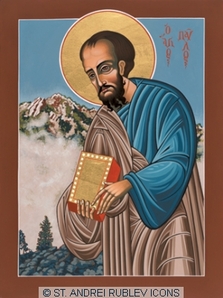 "If I must boast, I will boast of the things that show my weakness." That is what St. Paul said in the Second Letter to the Corinthians (2 Cor11:30). Most of us would not boast of our weaknesses, nor would we even think of it as virtuous in society as it is today. In fact, such behavior could be perceived as whining. But this is not at all what Paul was doing when he boasted of his weakness. He was affirming the reality that his humanity was indeed weak, as it is in all of us, and therefore that he needed to rely totally on God. He had previously said that he had suffered all sorts of punishments and cruelty during his ministry. He did not say this because he wanted pity or to complain about it. Instead, Paul was saying that he understood that all of us are weak and can do nothing apart from God. And he was saying that he understood the pressures and difficulties that life puts upon us as we try to remain faithful to the Lord. I have always believed that if something is good and worthwhile, if we really believe in it, then it is worth suffering for. So it is for parents when they have children. They make sacrifices gladly because they love their children. They willingly sacrifice time and money, as they work to feed, house, clothe, and educate their children. They do it because of love, not obligation. So it is for an adult child who takes care of an elderly parent when the parent can no longer care for him or herself. So it is for any caretaker of a sick or disabled spouse or child. And so it is for any disciple, “a worker in the vineyard,” who dedicates his or her life to evangelization simply by trying to live Gospel values. What St. Paul is saying is that most disciples will live ordinary lives. (It seems he saw himself as ordinary, but with an extraordinary call.) However, we can make our lives extraordinary by how we choose to live our baptismal vocation as priest, prophet, and king. We can see our own ordinary lives as extraordinary because we see all as gift. Therefore we can be extraordinary because of the good that others experience in us by how we live our lives in response to the gifts we have received. Such a person cannot contain their love, mercy, kindness, care, and joy even when they are experiencing the suffering, which, as St. Paul said, is inevitable. All of us, no matter what vocation we are called to, live lives that are ordinary. Being human makes us all ordinary. And as ordinary people we have the same ups and downs, joys and sorrows, excitement and boredom that everyone else experiences during life. All of us have times of pain, confusion and darkness, and we all question “what it’s all about.” This is simply part of being human. If we are alive, we will struggle. Some people we now consider to have been very holy lived lives that seemed ordinary, yet upon further examination were far from it. These are people such as St. Thérèse of Lisieux who would have been forgotten except for the autobiography she wrote under obedience; or Blessed Pier Giorgio Frassati, who seemed like an ordinary young man on fire with love for Jesus, who as a layperson did great things for the poor without anyone knowing. There are people such as St. Gianna Molla who was an ordinary doctor and mother, who gave her life to protect the unborn child she carried rather than abort the child so that she might live; or Blessed Franz Jägerstätter who was an ordinary farmer and gave his life as a martyr rather than serve in the Nazi army. And there is St. Bernadette Soubirous who was illiterate and had no interest in becoming book-smart because all she wanted to do was love Jesus and Mary. She wasn’t just ordinary; she was totally unremarkable at first glance, yet she rose to sanctity because of her love for God. It would be a mistake to think that anyone who serves God with all their strength and all their love is not pouring themselves out the way St. Paul did. We, as disciples, may not get notoriety, but we do pour ourselves out for Jesus, who also poured Himself out for us on the Cross. We want to share the message of Christ because we know the freedom He brings to those in bondage. We want to bring justice where it does not exist because we know that is the way of God. We want to literally share the wealth of His love and healing. We do it because we love Jesus and we want to love Him in return by loving Him in His people. 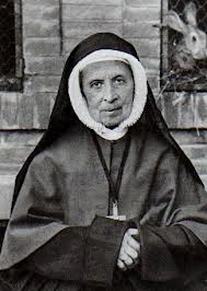 St. Thérèse Couderc, the foundress of the Religious of the Cenacle, once said: "We die by pinpricks." This saying made an impression on me (no pun intended) and I have reflected on it often. I think what she meant is that it is one thing to be martyred by giving one's life in a grand gesture of imitating Christ. But to suffer the little daily, ordinary pressures and stresses of life is the path to holiness that most of us are offered. The little things are really the proving ground of our holiness. It is easy to talk about being holy, but when we are in the arena of our daily tasks it becomes more difficult. When driving a car do we find annoyances, (the often seemingly “idiotic” moves of the other drivers), to be events in which we can act as a Christian, or do we lose our temper? The path to holiness that we can take is that of patience and forgiveness. The neighbor's barking dog or the children who are noisy when we desire quiet, the disappointment of a friend who lets us down, the sink that backs up, the service-person who does a poor job, the disobedient or strong-willed child, the doctor who makes us wait interminably in his/her office, the car that breaks down, the argument that does not go our way, the disappointments in our own behaviors: all these little daily frustrations are merely part of life. We can let them eat at us and seem to ruin our lives, or we can choose to turn them over to God for help, asking for the grace to cope. These challenges are the fertile ground of our call to holiness. The good news is that we are never too far gone to start letting the Lord help us to hone our weaknesses into the strength that is really His. What St. Thérèse Couderc said means that we are to die to ourselves by these pinpricks. In other words, the pinpricks can be the path to letting go of our will and letting God be fully in "the driver's seat." We can continue to ask ourselves if in the light of eternity the frustration we are experiencing is important or if we can let go of our will and let Him find another way for us. We can ask the Holy Spirit to send us the grace and wisdom to respond the way Jesus would have us respond. We can ask for the discernment to know if this is really all that important such that we let it go and move on, or if we need to make a big deal about something (such as an injustice). Then we need to ask how to deal with it with love. The bottom line is this: ordinary events in ordinary lives make up the majority of our experiences. But every one of those moments has the potential to become extraordinary by inviting grace into it. We can see with new eyes and love with renewed hearts. We can become extraordinary simply by letting God mold us through those pinpricks, by accepting that every event is an opportunity for growth in our spiritual lives such that with St. Paul we can say: "If I must boast, I will boast of the things that show my weakness." When we do that we are showing that in our weakness the Lord is strong. It is He who gives us every good gift, and it is to Him that the glory belongs. May we be filled with the grace to handle the little things with love! May we have the wisdom to know what is truly important in our lives, and to let go of the small, insignificant disappointments! May we have the ability to see ordinary things and ordinary people as extraordinary because we see the presence of God in them! And may we see the hand of God in ourselves, realizing that with Him we are truly strong! Let us continue to meet in the Heart of Jesus, who in His extraordinary love for us, helps us to become more like Him. Peace! The icon at the top is St. Paul the Apostle by Rev. William Hart McNichols and can be found at http://www.standreirublevicons.com/gallery.php?action=viewPicture&id=280 The photo is of St. Thérèse Couderc, (1805-1885) foundress of the Religious of the Cenacle.  When shopping at certain stores I am always amazed at the variety of vitamins, supplements, pills, and potions there are on the shelves. There are supplements for joint health, heart health, immune system health, digestive health, and for just about any body-part of which you can think. I admit to taking a number of these supplements, too, just to make sure that I am getting all the vitamins and nutrients I should be getting...and to keep that ever creeping-up cholesterol at bay without needing medicine. We should get everything we need from our diet, but that is not always (or often) the case for many of us. Therefore we can get a bit obsessive about our health, which really is not a bad thing. We ought to be concerned. After all, our body is a gift from God and we need to be good stewards of so great a gift. With all the time and attention our culture urges us to give to our bodies, it (also) amazes me when we put our souls on the back burner. We are encouraged to be concerned about the ravages of time upon us, needing anti-aging and “youth restoring” products. Yet with all this concern about our bodies, we can become complacent about the health of our spiritual life. And while we push ourselves to the brink with work and other concerns, why do we not take the time out to develop the part that we need the most, which is our spiritual life? It may feel like we must deal with whatever deadline looms closest, and therefore we have to take care of that issue first. It makes sense, but what if there are deadlines we don't know about. What if the Bridegroom came tonight? Would we be ready? I think that our culture is such that we are so stressed by the many demands put upon us, that we often relegate faith issues to the back burner, or the "I will get to it later...I promise" list. But then something else crops up the next day and the spiritual life gets pushed farther and farther back on the ubiquitous "to-do" list. Unwittingly, we put it off so often that our fervor grows cold. We think that we are doing just fine until some crisis hits and then we feel totally a-sea and lost. Sometimes in such a state, we do turn to God, and when He seems distant, we blame Him! It is important that we do not allow ourselves to be deceived into thinking that we can put off until tomorrow what we really need today. If we believe, we cannot ignore working on our relationship with Jesus and we cannot expect that merely going through the motions or fulfilling obligations will be enough. In the Old Testament the saddest example of this is when Israel divided into two parts due to sin and strife from within. The northern kingdom, Israel, fell to its enemies within 200 years of the split. The southern kingdom of Judah, the portion with Jerusalem and therefore the Temple (which contained the Ark of the Covenant) and the king who was from the line of David, was totally complacent as they watched their brothers and sisters get carted away to slavery by a foreign nation. They were guilty of the same sins as those which moved Israel far from God. But their behavior was far worse because they saw Judah crumbling all around them and persisted in their mistaken belief that Jerusalem would not fall, even as the prophets sent by God cried out that they were doomed unless they changed. They did not change, and Jerusalem did fall. The Ark was carried off, there was never a crowned king again, and they lost their freedom for many years. They did learn their lesson, but their complacency cost them much. Jesus gave the same caution in His preaching. The Gospels are full of messages in which He said we do not know the day or hour of His return. In Matthew 25 He tells three stories, each with the same message, each story growing in intensity. The first is the story of the ten virgins, five of whom were foolish and five of whom were wise. The wise ones were prepared by living a virtuous life. They had their oil: that is, they had prepared spiritually throughout their lives so that when the Bridegroom arrived they could enter the banquet. The five foolish ones were not bad people. They simply were not prepared. They were complacent and waited until the last minute. The problem, however, was that they did not know when the last minute was to be, so as they slept they missed out on the time to prepare. Therefore, when Jesus came they were not ready. The second story is about three men who were entrusted with talents, a form of money, belonging to a wealthy man. Two of the men invested the talents they were given and doubled the amount. But the third, who was complacent, buried his talent in the ground. The master was very displeased with that one, and he ended up in exile. Remember, it was his choice to be complacent, so he chose the outcome, in a sense, as well. 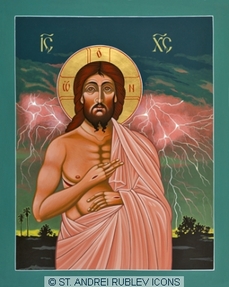 The last of the stories is the one about Judgment Day: the sheep on Jesus right side are the blessed that lived by the gospel message, and the goats on His left are the complacent that did not do what they needed to do. The sheep fed the hungry, clothed the naked, and visited the sick and imprisoned. The goats were too self-preoccupied and neglected to do works of mercy and charity. The point of all three stories is that we need to do these things as we can throughout our lives: being complacent can really be disastrous. We do not know when we will meet the Master face to face. As I used to tell my students, nowhere in “the contract" does it say we were guaranteed to have woken up this morning! We do not know when the hour will be. The point I am trying to make is that there are many, many good people who try their best to do what they are supposed to do. But the gospel challenges us by saying that we need to do more than fulfill obligations. We need to have a relationship with the Lord who loves us more than we can imagine. He wants to help us to side-step the traps that lead us away from Him. He wants to be there when we need Him most. He also needs us to help spread that love to others. We are, as St. Teresa of Avila said, the only hands and feet He has. We cannot go to church every week and simply put in time. We cannot settle for stale faith. Nor can we settle for thinking that it is someone else's job to evangelize others. We cannot settle for thinking someone else should be feeding the poor or clothing the naked, especially those in our own families who are spiritually, emotionally, or materially poor. Jesus urges us continually in His preaching to accept His love and then to bring it to others. If we are truly disciples, and if we truly love Him, that love will fill our hearts so full that we will be compelled - joyfully compelled - to bring that love to others. The best way we can bring His love to others is to know it ourselves by experience, not just by intellectual understanding. To do that we need to offer ourselves to Jesus in prayer, at worship in church, in getting involved in our parishes by attending classes and in teaching (if we are able), by getting involved in works of charity and outreach, and in supporting one another. There is no time like the present. After all, we do not know the day or the hour. Let us “take our spiritual vitamins” and nurture our relationship with the Lord. I would not want any of us miss out on one minute of the awareness of being so loved by our magnanimous, merciful, compassionate God by being complacent about our relationship. Even when we do not feel it, if we have a relationship as a foundation beneath us, we know we are very deeply loved. May we have the grace to attend to our relationship with the Lord so that we may receive His love and be enlivened in our faith! May we seek Him always, trusting in the mercy and compassion He promises! May we find Him all around us, reminding us of His great love for us! May we be re-energized in our worship, renewed in our strength, and re-vitalized in our hearts and souls! And may we find rest in Him who seeks us daily and who yearns for us to ever give Him our hearts! Let us continue to meet in the Heart of our loving God! Peace! The photo on top is mine. The icon is The Second Coming of Christ (Matthew 24:27) by Rev. William Hart McNichols and can be found at http://www.standreirublevicons.com/gallery.php?action=viewPicture&id=97 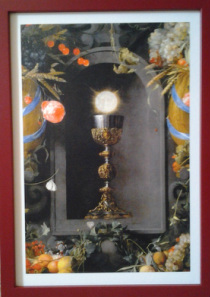 Today is the Feast of the Sacred Heart of Jesus and in reality it is about one thing. All of the Scriptures are about one thing. God's creative word, which put it all into motion when there was nothing, is about one thing. Everything God has ever done is about one thing. There is nothing that exists and nothing that will be that is not about that same one thing. That one thing is Love. St. Paul tells it so much better than I ever could in Romans 8, beginning at verse 28, when he boils it down to that one thing. He says "For I am convinced that neither death, nor life, nor angels, nor principalities, nor present things, nor future things, nor powers, nor height, nor depth, nor any other creature will be able to separate us from the love of God in Christ Jesus our Lord." And I say, "Amen!" The Feast of the Sacred Heart of Jesus should not be a surprise to us. Even though it is a devotion which took root in the 17th century after the visions of St. Margaret Mary Alacoque, there is a long history of devotion to the love of Jesus by adoration of the Heart that lived and died for love of His people. Some say it goes back to the 11th century, though it was a private devotion for many centuries. But it was really during the 17th century when this devotion took off. It is not a devotion to the physical heart of Jesus, though it is often depicted that way, but rather it is a devotion to the incredible love that Jesus has for His people. It should not surprise us because the entirety of salvation history is a love song by God to His people. Every word of Scripture is part of this long love song. Jesus, the Son of God, who is God's love, came into the world to fulfill the promise made by His Father, which was to redeem us from the bondage of sin and death. I often imagine what it must have been like to have met Jesus during His lifetime. Would I have seen Him as an ordinary man, or would I have been so awed by His presence that I was moved to know He was something more? It is hard to know given that the apostles struggled with it for so long. But one thing is clear: they knew He was extraordinary and they responded to the love with which He lived His life. He lived totally centered on the Father and on serving others, dying for us out of love. The Feast of the Sacred Heart is indeed a love story which can inflame our hearts as much as the two disciples on the road to Emmaus who said "Were not our hearts burning within us while He spoke to us on the way and opened the scriptures to us?" It can inflame us the way it did St. Paul who wrote the great hymn describing Christ: "Who, though he was in the form of God did not regard equality with God something to be grasped. Rather, he emptied himself, taking the form of a slave, coming in human likeness; and found human in appearance, he humbled himself, becoming obedient to death, even death on a cross" (Phil.2:5-8); or when Paul wrote the most eloquent lines about love in 1 Corinthians 13, which begins: "Love is patient, love is kind...." He is describing not just a poetic imagining of love, but he is describing the actual love of Jesus for us. It is no surprise then that with our realization of the enormity of the love of Jesus we would want to celebrate and adore the Heart that bore so much suffering for us. It is no surprise that we are so captivated by His heart that we would want to fall to our knees before it, in awe and wonder. It is no surprise that He would reveal His heart to a young sister, Margaret Mary Alacoque, in 1675 and tell her to spread the devotion. It seems that He was not seeking adoration for His own sake, but that He wanted her to spread the word at how large His heart really is. His heart is so filled with forgiveness, healing, mercy, compassion, consolation, understanding, and love that He wants us to know we have a home there. No matter what happens to us in this life we have a place of safety and peace within His heart. 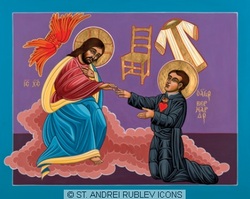 There are numerous saints who experienced the love of Jesus in ways that were overwhelming by any standards. Some had visions of Jesus inviting them to mystical marriage, which is symbolic of the union of their hearts to His. These are saints such as St. Catherine of Siena and St. Teresa of Avila, and even men, such as Bl. Bernardo de Hoyos. There is even St. Philip Neri, whose heart was so filled with the love of Jesus during a mystical experience in prayer that his own heart enlarged, expanding a couple of ribs. He was so filled with the love of Jesus that he emanated heat, such that he never had to wear a coat in the midst of winter! Our hearts, too, can become inflamed by love when we go to the Eucharist and allow ourselves to truly be immersed in what is taking place before our eyes. Every time the bread and wine become the very body, blood, soul and divinity of Jesus, we ought to be so awed that we can barely think of anything else but that one reality. Have you ever been so filled with the wonder of it that you are overjoyed when you are in the presence of the Eucharist or when you have partaken of this feast of love? Have you ever felt the joy beyond understanding that only the love of Jesus can bring, the love that brings you so far beyond yourself that you find yourself doing things that you never thought you were capable of doing, or feeling acceptance and yes, love, for those whom you never thought you could feel such warmth for? If not, you can ask the Lord to help you to receive these gifts and trust that whether you feel something or not, that He is infusing His love into you. His love helps us to go beyond ourselves, which I daresay we do more than we think or ever give ourselves credit for doing. The Sacred Heart of Jesus is where we can retreat when we feel our love has grown cold and we need His help so desperately. It is where we can go when we are so stressed that we can hardly take our next breath or formulate a prayer. His heart is where we can go when we are so broken that we cannot feel anything except pain. It is where we can find freedom from that to which we are addicted or enslaved. It is where we can find refuge when there is so much going wrong in our lives that we do not know how much more we can handle or what to do to cope with it all. It is where we can find rest when life makes us weary. When we turn to the Sacred Heart it is not like something magical will happen. No, it is that He is love and compassion: He loves us just as we are, broken and torn. He loves us in the goodness in which He made us. He loves us for who we are, not what we should be. He can send us the grace to persevere and the insight to take that next difficult step when things are tough. All we need to do is turn to Him and ask. It would not make sense that He would leave Heaven, become one of us, die a brutal death and rise again, if He were not preparing a heart such as He has in which we can find our home. There is much to celebrate in the Feast of the Sacred Heart. Let trust in Jesus’ goodness. Let us share the wealth of love with those around us by asking for the gift of His love. Let us adore Him by being reverent toward others and the world around us, so filled with beauty and the glory of the Lord. May we be filled with the love of Jesus as we come before Him in adoration and love! May we find the peace and the rest we need in the shelter of His heart when our own hearts are torn and bleeding! May we find the confidence through His love to trust that Jesus is with us in difficult times! May we have the joy and gratitude that comes with recognizing the great gift we have in the Heart of Jesus! Let us continue to meet in the Sacred Heart which is filled with love beyond all telling! Peace! The icon is The Mystical Marriage of Blessed Fr. Bernardo de Hoyos y Sena, SJ by Rev. William Hart McNichols and can be found at http://www.standreirublevicons.com/gallery.php?action=viewPicture&id=341 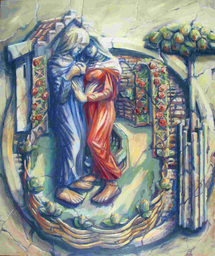 I know that I may seem a bit late: May is over. But today the pope finished out the Marian month, so I figure I am in good company as far as writing about Mary goes, even if it is June. The truth is that my love for Mary never goes out of date, so writing about her does not need to be bound to the calendar. With that said, my favorite Marian devotion is the Visitation which was celebrated liturgically last week. There is something that reaches out and grabs my soul when reflecting on these two women: they have recognized that they are both pregnant with children who will change the course of salvation history, and they stop the action and sing! They sing a glorious song of thanksgiving and praise to the God they love so much and whom they can only think to glorify. If you are wondering why I said they both sang, even though the Gospel of Luke clearly says: "And Mary said: 'My soul proclaims the greatness of the Lord...'" it is because I have always believed that there is no way that Elizabeth simply stood there and listened. I have always envisioned her chiming in and joining the song. And it was indeed a song; it was surely one she knew, given that Mary was quoting the song of Hannah from the book of Samuel, though she was making it her own by adding to it. Besides, with all the joy these two women were experiencing, it defies the imagination that one woman would just stand there staring at the other who sang a solo song of praise. To step back a bit, the "backstory" is that Mary's first response to being overshadowed by the Spirit, and becoming pregnant with the Savior of the world, Jesus, was to go to her kinswoman, whom the angel had informed her was in her sixth month of pregnancy. Without any thought of herself, Mary rushed into the hill country of Judah, which was some distance away, to serve her older cousin who was well past the age of bearing a child. It was the Love with which she was impregnated that coursed through Mary's entire being which compelled her to go. Don't get me wrong here: it was a free choice to go. But Mary was already filled with love, given that she was "full of grace" (as announced by the angel) and it was that love that enabled her to be chosen in the first place. She was already a disciple of God, the Father of this Child, and so when she heard of her cousin's situation, she wanted to go share some of that love by serving Elizabeth. Elizabeth was a woman of prayer who was already, no doubt, praising God for letting her have a son when she was well past child bearing age. She already believed what the angel told her husband about this child she was to bear. He would be a very important prophet, paving the way for the long-awaited Messiah. Mary had not yet told anyone she was pregnant, maybe not even Joseph. But even if Joseph knew by then, he would have been the only one. Elizabeth simply could not have known Mary was pregnant. And thus, she could not have known that Mary’s child was the Messiah her son would announce. Therefore, when Mary showed up and Elizabeth immediately cried out that Mary was most blessed among women and that she wondered how the mother of her Lord should come to her, there is no way she could have known except through the Holy Spirit which bound them together through love. That they both knew of each other's pregnancies is miracle enough, actually. But the joy of the Spirit and the love that is the cause of that joy was so great that it spilled over everywhere, as Jesus would later say about spiritual gifts: "… good measure, packed together, shaken down, and overflowing will be poured into your lap." (Luke 6:38) They both already seemed to know this deep in their hearts. God was already giving them this overflowing, which is indeed what love does. 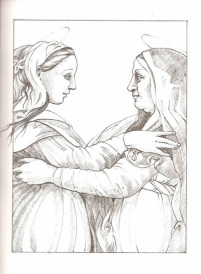 Mary immediately began to sing the praises of God after Elizabeth announced that the baby in her womb leaped for joy. And as I said, I believe Elizabeth joined in the song, even if only on the "refrain" singing, "Holy is His name!" That Luke records nothing else after this beautiful hymn of praise except that Mary stayed three months tells us that the most important parts of this story are service and praise, both of which arise from the joy which only the Spirit can give; this joy is ultimately an expression of Love which is so vast that it has to spill outward. The two women most likely did not know each other very well prior to this meeting. But that Mary knew to go serve her, and did so very willingly and freely, says a lot about who Mary already was as a disciple of the Son in her womb. The love within her was like a song, which needed to be sung in order to express the greatness of this event, not the greatness of Mary. She did not lord it over her cousin - (pun definitely intended!) - when she arrived. She did gloat that her baby was the greater, though He really was. She hardly said anything except to praise God and then to serve. She focused all her attention outward to God and to Elizabeth. Mary focused on Love, and Love alone! That is what service is about if it is truly humble. The other thing that strikes me about the Visitation is that it is goes beyond masculine and feminine. It is a feminine mystery in that two pregnant women meet and rejoice as only women can understand what is happening within their bodies. And it is feminine in that the Spirit gave them the "women's intuition" to know who each other was carrying. It is masculine because they are both carrying strong males who will change the face of salvation history. And outside of the gender roles of the day, both sons were dedicated to God alone and never married. Therefore more than anything this story is about the action of God. It is God who is coming into the world, and these two brave women are willing to help facilitate that. Mary and Elizabeth teach a tremendous amount. They teach us that serving God is natural and ought to be something rooted within us. They teach us that when we love God deeply we think little of our own convenience or comfort; we put others before ourselves. They teach that when we do this, we are filled with much joy. When we serve we are literally touching God because of the love which is our motivation. How can we not have joy when touching God? Keep in mind that this is not sentimentality of which I speak. This is not about something wonderful we did. Rather, it is a joy that has its origin in God alone. We cannot conjure it up; it is a gift from God. It is the joy that is the result of love. This joy can even be present in the midst of a dire situation because one knows that God is there in the form of one's own presence to the one who is suffering. Since one who serves looks outward to others, that joy is often the comfort of knowing that God is present, even when things do not outwardly appear to be so. It is important to remember, that when we are serving anyone even in the simplest of ways, we are bringing God's love to them, regardless of whether anyone can articulate it. Love and joy are more than feelings: they are gifts from God. It is the sense that we are not alone. Our presence brings His presence because of the love we bear. Let us continue singing the song of love and joy such as the greeting that passed between Mary and Elizabeth. Let us allow that song carry us outward, planting that song into the hearts of others without turning attention to ourselves. If we keep singing the song of love, we will have hearts filled with gratitude such that we will be able to echo with Mary, and Elizabeth, too: "My soul proclaims the greatness of the Lord; my spirit rejoices in God my savior.... Holy is His name!" May we be filled with the Spirit of Love! May we be imitators of Mary and Elizabeth, sharing joy and love with friends and family! May we be moved to visit those in our families whom we have not seen in a long while, especially those older than ourselves! May we bring Christ to others, as Mary brought Him to Elizabeth. And may we never stop singing! Let us continue to meet in the heart of the Lord, who sings His song of Love always! Peace! The first painting is unknown in origin. Someone sent it to me years ago. The second illustration is a drawing by Rev. William Hart McNichols. It is Mary and Elizabeth from Pontormo (Jacopi Carucci) (1494, Pontormo - 1557, Florence), "The Visitation (1513), Porch of the Church of the Annunciation, Florence. It appears in the book The Fifteen Mysteries in Image and Word by M. Basil Penninton, illustrated by Fr. McNichols. |
Heart Speaks to Heart
|

 RSS Feed
RSS Feed

